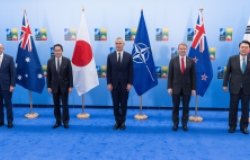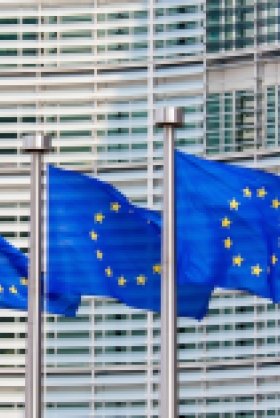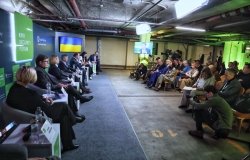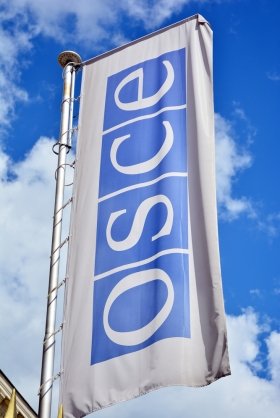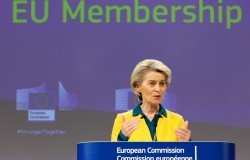<font color="#990000"> <b>Special Event--</b></font> The Foreign Policy of Serbia and Montenegro: Perspectives and Priorities
an informal discussion with Vuk Draskovic, Foreign Minister of Serbia and Montenegro
Overview
The Foreign Policy of Serbia and Montenegro: Perspectives and Policies
May 10, 2004
Staff-prepared summary of the EES informal discussion with Vuk Draskovic, Foreign Minister of Serbia and Montenegro
Vuk Draskovic was recently appointed as Foreign Minister of Serbia and Montenegro, having had a distinguished career as a journalist, novelist and leader of the democratic opposition to Milosevic in the 1990s as head of the Serbian Renewal Movement. EES held an informal discussion with Minister Draskovic, along with a group of journalists, scholars, diplomats and government officials on the ongoing events in Serbia and Montenegro.
During his wide-ranging talk and discussion period, Draskovic touched upon most of the critical issues confronting Serbia and Montenegro today. Regarding relations with the United States and NATO, Draskovic noted that in a meeting with Secretary of State Colin Powell, it was made very clear that the most important factor for improving bilateral relations is Serbian cooperation with the International Criminal Tribunal for the former Yugoslavia (ICTY). Secretary Powell emphasized that "no door will be closed to Serbia and Montenegro" if it complies with the demands of the ICTY. Recognizing the continuing opposition in Serbia to the Tribunal, Draskovic stressed that Serbia must fulfill the requirements of the Hague Tribunal "completely and unconditionally," as its primary international obligation.
Regarding Kosovo, Minister Draskovic stated that he is ready to meet Albanian leaders to negotiate on Kosovo's future at any time, based on the series of proposals recently presented by the Serbian government for the establishment of several ethnically-determined autonomous zones within Kosovo. Before these discussions take place, however, the leaders of the Kosovo-Albanians must acknowledge the ethnic cleansing of the Serbian population that took place in Kosovo, not only during the recent outbreak of violence on March 17 and 18, 2004, but also in June 1999 after the end of the NATO air strikes against Serbs and the removal of Serb military forces from Kosovo. Draskovic emphasized that the international community must support the Serbs in Kosovo today and their right of return, in the same way the Albanians were supported after the ethnic cleansing perpetrated by Milosevic's regime: houses must be rebuilt, churches must be restored, control must be decentralized and conditions for the return of Serbs to Kosovo must be established. Draskovic noted that Serbs inhabit only 15 percent of the territory in Kosovo, and that this small area must be protected.
Foreign Minister Draskovic emphasized the importance of maintaining close and friendly ties to the United States—a bond that was formed by fighting side by side in two World Wars and through the rescue of hundreds of US pilots on Serbian territory during World War II. He noted that it was Serbia's "historical destiny" to join the United States and the global alliance against terrorism.
He also insisted that the United States should remain engaged in the Balkans particularly as an "honest broker" on the Kosovo issue. When asked whether it was a good idea for the EU to eventually take over the role of UNMIK in Kosovo, as they are doing this year in Bosnia, Draskovic demurred, claiming that it is important for the US to continue to play a role in both trouble spots. Draskovic acknowledged that integration with the EU is an important foreign policy goal of Serbia, but that it is not the only, or even the most important, foreign policy goal. Other issues are of equal importance to Serbia, including integration into NATO's Partnership for Peace and eventually, NATO itself. Draskovic noted the strong historical ties that Serbia has with Russia and thanked Russia for its immediate help to Serb refugees in Kosovo following the two days of violence in March 2004.
Turning to domestic issues, Draskovic noted the forthcoming presidential elections, to be held on June 13, 2004, would be a crucial turning point. He warned that it would be very important to keep the current front running candidate, Tomislav Nikolic of the nationalist Serbian Radical Party, from becoming the new president, as it would be a disastrous symbolic and substantive image for Serbia at a critical time. Draskovic also emphasized that the state union of Serbia and Montenegro must not be allowed to disintegrate and must be strengthened for the well being of the Serbian and the Montenegrin peoples.
Finally, in dealing with the independent former-Yugoslav states, including Croatia, Bosnia, Slovenia and Macedonia, Draskovic claimed that all sides needed to focus on the future, rather than dwell in the past. All of these countries need to embrace "truth and reconciliation" in order to overcome the bloody legacy of the 1990s.
Hosted By

Global Europe Program
The Global Europe Program is focused on Europe’s capabilities, and how it engages on critical global issues. We investigate European approaches to critical global issues. We examine Europe’s relations with Russia and Eurasia, China and the Indo-Pacific, the Middle East and Africa. Our initiatives include “Ukraine in Europe” – an examination of what it will take to make Ukraine’s European future a reality. But we also examine the role of NATO, the European Union and the OSCE, Europe’s energy security, transatlantic trade disputes, and challenges to democracy. The Global Europe Program’s staff, scholars-in-residence, and Global Fellows participate in seminars, policy study groups, and international conferences to provide analytical recommendations to policy makers and the media. Read more
Thank you for your interest in this event. Please send any feedback or questions to our Events staff.

